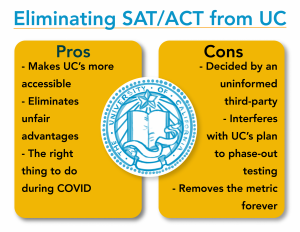Yes, it removes a classist barrier to college
September 14, 2020
As a senior applying to college, I have spent hours studying test-taking strategies, spending Saturday mornings taking countless SAT practice tests and taking the actual test multiple times to reach my goal score. But just as I was finally ready to submit my scores, a judge ruled that the University of California system would no longer be able to consider SAT or ACT scores in the admissions process. Initially, I was very disappointed, having worked hard to make sure my scores were high enough for the colleges I am applying to—more than half of which are UCs.
However, I now realize that the ruling against standardized testing was ultimately the right choice. An inaccurate reflection of student achievement and academic ability, standardized testing “success” often depends on how much time and money a student or their family can put toward test prep. Additionally, students with disabilities looking to take the SAT and ACT are facing a decrease in access to suitable testing sites and legally required accommodations due to coronavirus.
Standardized testing primarily measures a student’s test-taking ability, not their academic abilities. Advocates argue that it fulfills the need for a national metric to account for differences between how schools grade, but a national metric is not a necessity: Admissions officers are aware of the rigor of different schools, and the context in which students’ grades are considered.
The UC System’s original plan regarding standardized testing was to use the SAT until 2025, at which point they hoped to have created and utilized their own, UC-specific standardized test. While a UC-specific test may resolve some of the problems of the SAT and ACT, it is still a standardized test, and therefore is not an accurate reflection of student performance.
Students pay between $50 and $65 just to take the test itself, not to mention transportation, parking and test prep fees. In pursuit of higher scores, students can pay thousands of dollars for standardized test prep.
AJ Tutoring, a popular Bay Area tutoring and test prep company, charges $1,170 for a group SAT prep class with 17.5 hours of instruction and four practice exams. Many students who can afford these services take both the SAT and the ACT multiple times, leading to hundreds of dollars in testing fees alone.
This puts lower income students at a disadvantage, as they often can’t take standardized tests over and over again. The financial inequalities of standardized testing make college admissions inherently classist.
What starts as a score on a standardized test can set off a chain reaction: Students who are unable to access test-prep resources may be at a disadvantage when applying to college and may be left with fewer job opportunities in the future, continuing a cycle that bars access to higher education. A score on a test shouldn’t be the difference between being able to go to college and access more job opportunities or not, especially when standardized tests don’t accurately measure a student’s abilities and favor students able to pay thousands of dollars for test prep.
Although standardized testing has always had flaws, those have been further exposed by the pandemic. Financial hardships or canceled tests due to coronavirus put students at a disadvantage even at test-optional colleges. Both test-optional and test-blind schools often use SAT and ACT scores to judge applicants for merit scholarships, and multiple college counseling websites advise that students who choose not to submit test scores will need to have the rest of their application be more impressive.
The lack of access to adequate standardized testing sites during the pandemic puts students with disabilities at similar disadvantages. A lack of access is inequitable, and could lead to students who need accommodations but don’t receive them getting lower scores, which could hurt them in college applications and affect their career and future. Students without access to necessary accommodations may get lower scores which could perpetuate the false and harmful stereotype of students who need accommodations as being unable to achieve academic success.
The coronavirus has also worsened many students’ financial situations, creating yet another barrier to testing and test-prep resources.
Given that the UCs are more affordable than private colleges in California, they need to be accessible. The average tuition for a private college in California is a whopping $32,964, compared to $14,253 for in-state UC tuition.
Students who are applying to UCs because of the lower cost shouldn’t be discounted based on their standardized test scores — or lack thereof — especially given the prevalent financial barriers.
Increased awareness of the flaws of standardized testing and a decreased reliance it in admissions might be some of the few good things to come out of COVID-19. Standardized testing as a whole does not accurately portray a student’s academic abilities or achievements and is a system that puts low income students and students with disabilities at a disadvantage in college admissions. Standardized testing creates an unequal playing field for students and should not be reinstated after COVID-19. By removing standardized testing, we finally have the opportunity to make the admissions process fairer and accessible for all students.




